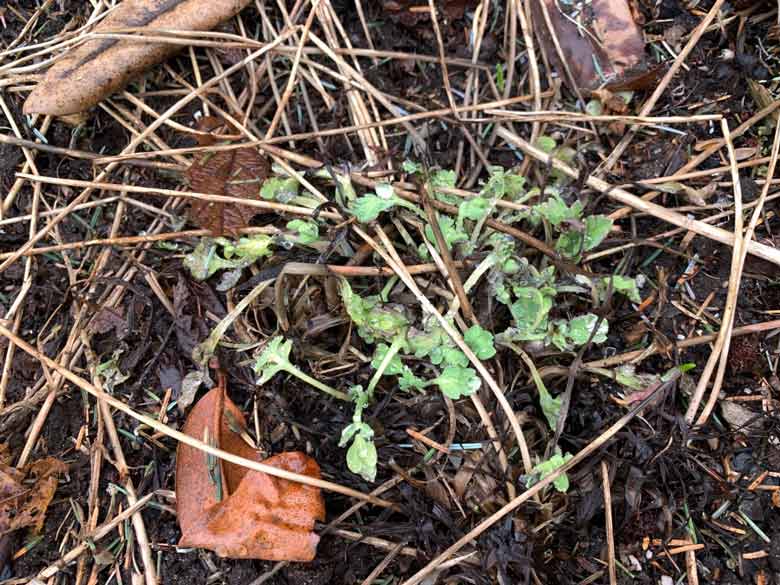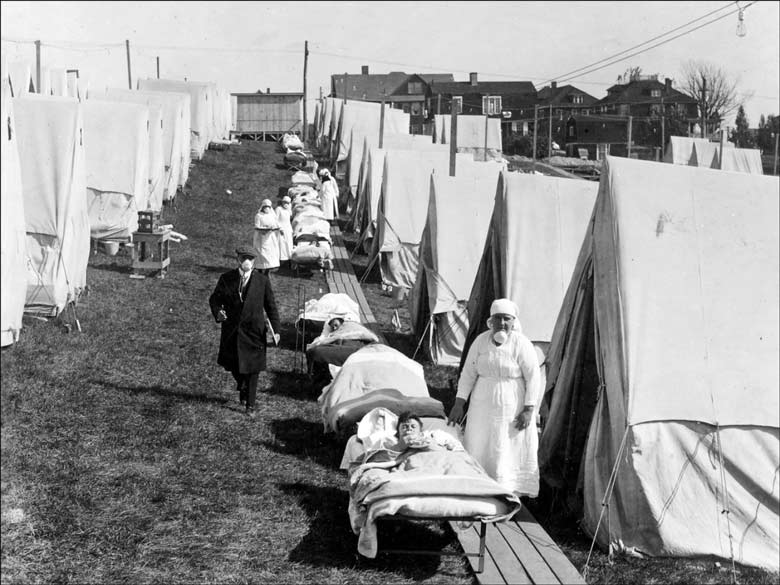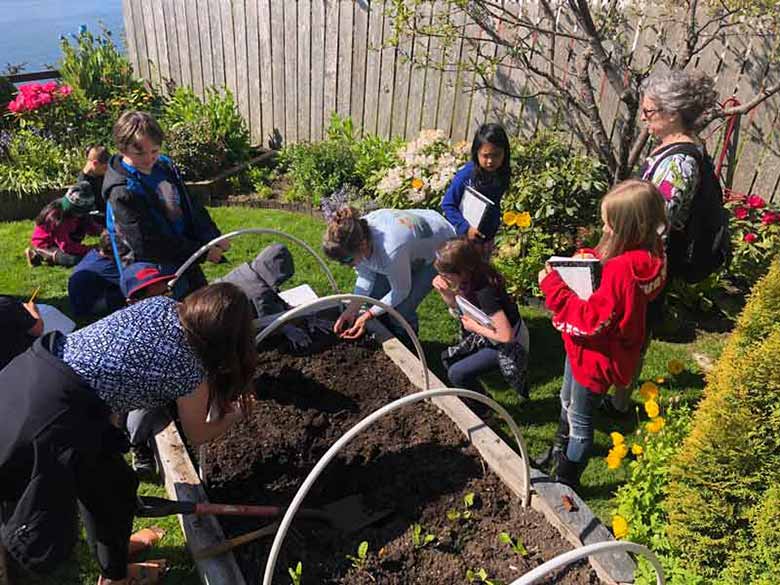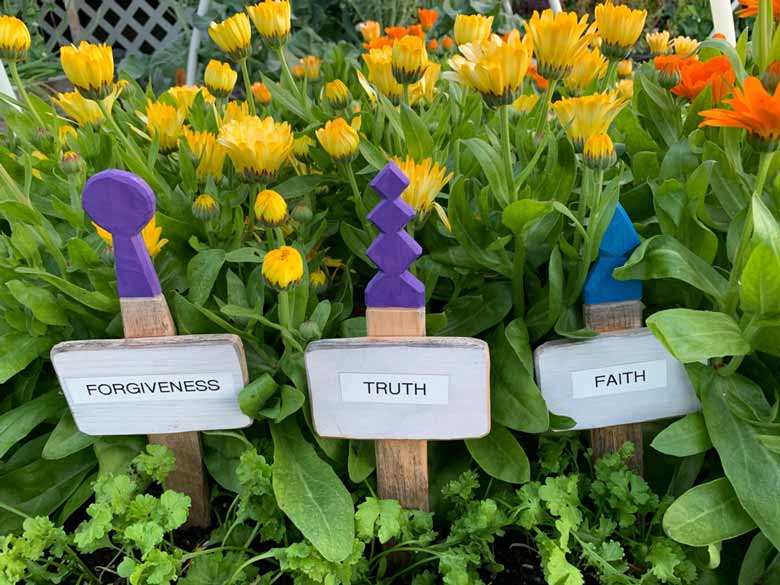Gardening feels like a bosom-hug from my Grammie. She loved to grow beans, putzing quietly in the dirt. Now it’s April 2020 and COVID-19 has gifted me with an unparalleled opportunity to garden more. I think of Grammie while I turn the soil for spring planting…
While the rules of social interactions have changed, the “rules” of gardening remain the same. And since gardeners are such a resilient lot, accustomed to dealing with the quirks of Mother Nature, I like to think they are also better adapted to coping with the almost-daily changes in lifestyle and proper mask procedures handed down by government officials.
Lately, I find myself tuning in less often to national and international news. I prefer to mentally sample updates through our local public radio station, KMXT-100.1 FM in Kodiak, Alaska.
[perfectpullquote align=”full” bordertop=”false” cite=”” link=”” color=”” class=”” size=””]In my state, we have been told to stay home except for essential needs. Those of us who garden consider gardening essential, but would the police officer who pulled you over agree? — Kathy Purdy, ColdClimateGardening.com[/perfectpullquote]
At any rate, since gardening is good for our physical, mental, and emotional health let’s dig up some practical tips.
The importance of gardening: Tips for spring’s mud season
No matter where you live, it’s a clean-slate feeling to begin your growing season by taking a spin around your garden.
So if you need an excuse to go outside, begin with a tour of your garden.
- Grab a clipboard and put a smartphone in your pocket. You’ll discover terrific ideas as you stroll around.
- Note any problems that need to be addressed, changes you want to make.
- Take a look and take photos to keep you inspired. (Just a thought: If you’d like some photo tips, get my free 4-page PDF when you sign up for my newsletter).
If you can see dirt (that is, no snow remains) and you can pull the weeds out of it, go ahead and weed. Easy does it, though. Tiny plants like Iceland poppies need time to get re-established.

Early spring in most places is mud season. And you aren’t supposed to stand on waterlogged soil. So stand on the lawn and weed whatever you can reach from there. Actually, you’re not supposed to stand on a waterlogged lawn, either, because it compacts it, restricting the flow of air, water, and nutrients. But I won’t tell if you don’t.
Then there are weeds which happily grow under the snow, so they’ve already got a head start. And if you’re the type to kneel when you weed, better wear waterproof rain plants, er pants.
[perfectpullquote align=”full” bordertop=”false” cite=”” link=”” color=”” class=”” size=””]When people are exposed to nature, they tend to not only think more creatively and feel better. They also tend to be kinder and more generous with other people.
— Lisa Nisbet, a psychologist at Trent University in Ontario[/perfectpullquote]
Five of my gardening articles you might find helpful:
- Does snow help or harm plants?
- Easy vegetables, herbs, and flowers to grow in cool climates
- Want a dream garden? How to order seeds the easy way
- What is the best lawn fertilizer?
- Organic gardening in Alaska: My story
Speaking of weeds, have you heard of soil solarization? It’s the age-old method of using the sun’s power to control pests such as bacteria, insects, and weeds in the soil. The sun’s power ties in with the current crisis. I’ll explain how that works, right after this quick video from Maine:
What is soil solarization: How does it kill seeds and pathogens [2:21]
On a related topic, did you know that fresh air, sunlight and improvised face masks seemed to work a century ago?
And they might help us now.
At this point, we’re still hearing of governments enforcing quarantine and isolation. Public gatherings are being discouraged. My massage therapist is out of work. It’s the new abnormal. But did you know that health officials took the same approach 100 years ago when influenza was spreading around the globe?
Overall, the results from isolation were mixed. But records from the 1918 pandemic suggest that one, little-known technique for dealing with influenza was effective.

In his article, Coronavirus and the Sun: a Lesson from the 1918 Influenza Pandemic, author Richard Hobday tells us that medics of the day found that when severely ill flu patients were nursed outdoors, they recovered better than those treated indoors. According to public health records, a combination of fresh air and sunlight seems to have prevented deaths among patients as well as infections among medical staff.
[perfectpullquote align=”full” bordertop=”false” cite=”” link=”” color=”” class=”” size=””]As the coronavirus emergency disrupts usual routines and connections, nature may be an important balm. At root, nature is a reminder that the world is greater than us and our stress. —Eva Botkin-Kowacki, staff writer, Christian Science Monitor[/perfectpullquote]
Another little-known fact:
Research shows that outdoor air is a natural disinfectant. Fresh air can kill the flu virus and other harmful germs. Equally, sunlight is germicidal and there is now evidence it can kill the flu virus.

During the great pandemic of 1918, seriously-ill patients that were taken outside and put in the sun to experience open-air therapy as it was called. The treatments were effective. One report said it reduced deaths among hospital patients from 40 percent to about 15 percent.
So get thee outdoors.
Breathe in that fresh air. And when the clouds part, treat yourself to a daily, 10-minute sunbath.
Okay, we got gardening covered. Sunbathing, too.
Now, what about food?
Food is your first medicine, right? So when your immune system is compromised, guess what? You are more likely to get sick.
So take this to heart when you reach for that bag of chips: Studies have proven that excess consumption of the following foods can compromise your immune response, making infections more likely:
- Processed foods
- Foods and drinks high in sugar
- Refined carbohydrates
- Alcoholic beverages
Bottom line: If you eat a lot of foods and beverages that are high in sugar or refined carbohydrates, you may be reducing your body’s ability to ward off disease.
Eating a well-rounded diet high in pretty, colorful veggies and fruits (think rainbow) will give your body the vitamins and minerals it needs to fight off illness. In my town of Kodiak, Alaska, that would include salad greens, broccoli, raspberries, carrots, kale, wild blueberries, Swiss chard… you get the idea.
Oh, and eat fresh garlic, too. It’s particularly good for your immune system.

The importance of gardening: Connection
Remember, gardening improves relationships through connection, with ourselves, with our friends, our world family, and the earth.
[perfectpullquote align=”full” bordertop=”false” cite=”” link=”” color=”” class=”” size=””]Research shows that people who spend extended lengths of time around plants tend to have better relationships with others. [The Daily Mail][/perfectpullquote]
Dear readers, I hope you are able to get out in your garden. Especially on a sunny day!
As always, if you enjoyed this article, please share it with your friends on social media. The more the word gets out about the benefits and importance of gardening, the more positive change will happen.
And now it’s your turn. I’d love to hear how gardening or being outdoors these days has had an impact on your health and well-being. Your thoughts are important to me so please comment!
Yours in happiness and health,

P.S. When my Grammie wrapped her stubby arms around me, I just knew that everything was going to be okay.
Marion Owen is on a mission to help busy people survive day-to-day life by condensing topics such as photography, cooking, and organic gardening into bite-size pieces. Get Marion’s free 4-page “In Good Light: Photo Tips for Busy People” to feel confident and recharged when taking pictures.

Greaat reading